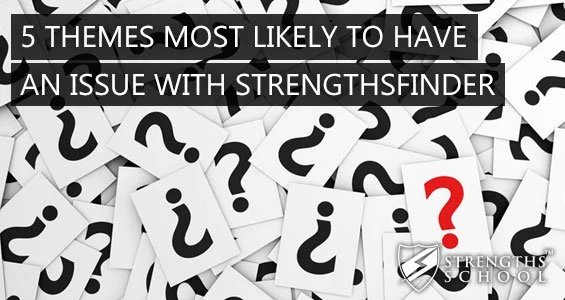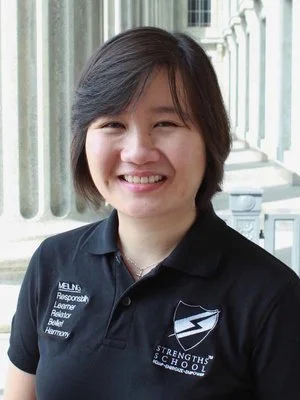5 Themes Most Likely to Have an Issue with StrengthsFinder
One Sunday, I was sitting around with a few other folks from the young adults group I was involved in. I got to talking about my work as a StrengthsFinder Coach (a common occurrence, if you hang around me often), and one of the young adults there remarked that she’d recently taken the CliftonStrengths assessment.
Curious, I asked: “Ah, really? What were your StrengthsFinder results?”
She responded, “Uh, I don’t really remember all five of them. I’m not sure how accurate the results are, though.”
A lightbulb came on.
“Do you have Restorative?”
“Yeah! That’s one of them. How did you know?”
Truth is, I didn’t – it was just a good guess. But based on my experience as a StrengthsFinder coach, Restorative is one of the top few talent themes very likely to find fault with their CliftonStrengths profiles.
In fact, there are a few talent themes that are likely to question the validity of their CliftonStrengths results, simply because of the way they’re naturally wired. So if you (or a friend) happen to have one of these themes and you had a similar reaction the first time you saw your Top 5 StrengthsFinder themes, fret not: you’re not alone!
Here are the top 5 themes most likely to take issue with their CliftonStrengths results, and the reasons for it:
Restorative: "I see the problems."
Individuals with Restorative are intuitively attuned to spotting and resolving the problems around them. But because they are natural problem-solvers, they tend to see the problems within their StrengthsFinder results.
For example, a friend of mine with the Restorative theme once told me that she didn’t much like her CliftonStrengths profile.
“Why?” I asked.
“Because I’ve got no red or yellow in my top 10,” she responded. (Red refers to the “Strategic Thinking” domain of leadership strengths, and yellow refers to the “Influencing” domain of leadership strengths.)
According to her, having no Strategic Thinking or Influencing strengths meant that she wasn’t a good thinker and that she couldn’t influence people on a larger scale.
(Side note: This is not true, by the way. We cover this common misconception in our article on the four StrengthsFinder leadership domains. However, it does serve as a classic example of the kind of disparity that individuals with Restorative will naturally spot within their CliftonStrengths profile or the StrengthsFinder philosophy.)
Deliberative: "I see the pitfalls."
Those with the Deliberative CliftonStrengths theme are careful and vigilant. They take time to weigh every option, mulling over the variables until all the possible pitfalls and obstacles come up -- and then they find ways to eliminate these obstacles. Due to the careful consideration they give to every situation or person they encounter, they tend to make outstanding decisions.
However, because of this natural wiring, many questions pop up the first time an individual with Deliberative sees their CliftonStrengths profiles.
Recently, we conducted a StrengthsFinder teambuilding workshop for a non-profit organization that wanted to develop their volunteer leaders and staff. One of the workshop participants had Deliberative in his Top 5 CliftonStrengths themes.
He asked, "How do you know these results are accurate? While I was taking the test and looking at each of the statements, I changed my response multiple times because I wasn't sure which one described me most. And sometimes I was so unsure of my response that I didn't get a chance to answer before the 20-second time limit was up and the test skipped to the next question."
This question, incidentally, is common amongst those with the Deliberative theme. Since they give such careful consideration to everything they do, they want to make sure the test is foolproof and that any possible pitfalls in taking the test have been accounted for and eliminated.
Analytical: "Where's the data backing up these results?"
For someone with Analytical, well-researched data is a trusted friend. People with this theme have an investigative bent, and tend to want to probe deeper to understand why things are the way they are.
For this reason, they are similar to people with the Deliberative talent theme in that they are the ones who often ask, "how do you know these results are accurate?"
In order for those with the Analytical theme to buy into the StrengthsFinder philosophy and 34 CliftonStrengths talent themes, they need to see the statistical support backing up the assessment tool.
This is where resources like the Clifton StrengthsFinder 2.0 Technical Report (detailing the development and validation of the tool) and Don Clifton's whitepaper on Investing In Strengths can come in handy.
I've also compiled a page on useful downloadable resources to make things easier for any StrengthsFinder aficionados wanting to learn more.
Strategic: "I see the possible loopholes."
People with the Strategic CliftonStrengths theme are talented in sorting through the clutter, identifying any potential obstacles and dead-ends, and then choosing the most efficient and effective path forward. They are inherently flexible in their thinking and will adapt their methods according to the needs of the situation in order to achieve the best outcome.
However, because of this natural wiring, they can intuitively see the loopholes in the StrengthsFinder philosophy (or their StrengthsFinder profiles).
Upon seeing his CliftonStrengths profile, a friend of mine with the Strategic theme remarked, "I think these results are dependent on the context. For many of the questions, I could swing both ways depending on what the situation calls for."
This flexibility and ability to adapt according to the situation is characteristic of the Strategic theme. Individuals with this theme generally dislike being "boxed in" because it limits their options -- and having multiple options is a core need of the Strategic talent theme.
(Side note: If you've encountered this objection from someone with the Strategic talent theme, one way to address it is to debunk the common misconception that StrengthsFinder tends to pigeonhole people into a particular stereotype, thus limiting the different roles and projects they could potentially take on and excel at. In fact, Gallup has a great article on this topic called "Debunking Strengths Myth #3.")
Consistency: "Are you sure these results are fair?"
Individuals with Consistency in their CliftonStrengths profile place a high value on fairness and equality. To someone with this theme, every person is valuable and therefore should be treated with the same amount of respect and honor as anyone else. Because of their natural wiring, they are keenly attuned to any unfairness or injustice within a system.
I once got a question from a participant in one of our StrengthsFinder workshops: "I missed quite a few of the questions during the assessment because of the 20-second time limit. Would this affect my results? How do I know my results will be as accurate as someone who answered all the questions within the timeframe?"
When I looked at his CliftonStrengths profile, I noticed he had Consistency as one of his top 5 talent themes and had an "a-ha!" moment. You see, because of his Consistency filter, he perceived that there was a possible bias -- and therefore unfairness -- with the StrengthsFinder assessment.
(By the way, on that note: To quote the Clifton StrengthsFinder 2.0 Technical Report, "developmental research shows that the 20-second limit resulted in a negligible item non-completion rate." This means that while creating the assessment, the developers have already accounted for the fact that some people might miss quite a few of the items and reinforced the test so that the non-responses wouldn't make a difference in the results.)
What do you think?
If you have one of these talent themes, does this article resonate with you? Or have you encountered someone who's had similar thoughts about their StrengthsFinder results?
Written by Tan Meiling
Responsibility • Learner • Relator • Belief • Harmony
As a Gallup-Certified StrengthsFinder coach, Meiling is passionate about helping people discover their innate potential and celebrating who they are. To that end, she enjoys writing articles and regularly posts on her blog, MeilingTan.com. Meiling is also actively giving StrengthsFinder coaching to individuals and facilitating workshops in Singapore.



